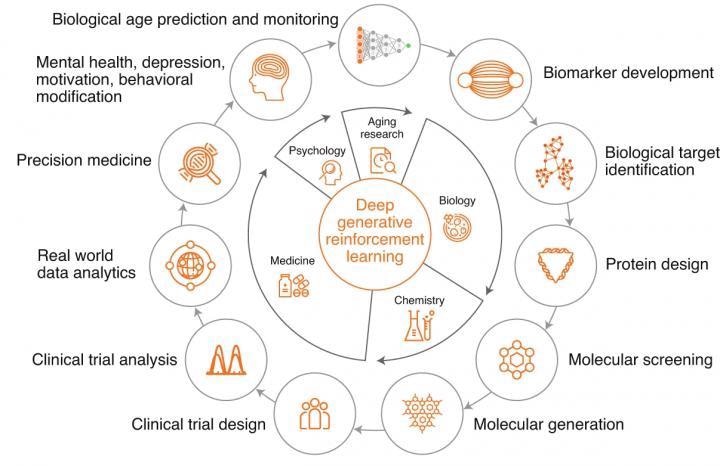Jan 28 2021
Deep Longevity, a 100% owned subsidiary of Regent Pacific recently reported the publication of an article titled “Artificial Intelligence in Longevity Medicine” in Nature Aging journal.
 Applications of AI in longevity medicine. Image Credit: Deep Longevity Limited.
Applications of AI in longevity medicine. Image Credit: Deep Longevity Limited.
The company specializes in the development and use of next-generation artificial intelligence (AI) for studies on aging and longevity.
The article describes a new field of study that brings together AI, fundamental research, and medicine, dubbed Longevity Medicine. Longevity Medicine can also be defined as the restorative and preventative medicine enabled by AI and the deep aging clocks.
The article was penned by Alex Zhavoronkov, a computer scientist with a PhD in biophysics, who is also the founder and chief longevity officer of Deep Longevity; Evelyne Yehudit Bischof, a practicing medical doctor trained in the top European and the US medical schools, who also actively takes part in aging research and gerooncology at the University Hospital Basel in Switzerland, as well as Shanghai University of Medicine and Health Sciences; and Kai-Fu Lee, one of the most prolific scientists and entrepreneurs in AI.
The conventional approach to medicine is the treatment of diseases. But scientists predict (Cutler and Mattson, 2006) that even thorough elimination of cancer would lead to only a 2.3-year increase in life expectancy in the United States at birth and a 1.3-year gain at the age of 65. Total elimination of pneumonia and influenza would result in gains of 0.2 and 0.5 years in life expectancy, respectively, in general.
These numbers are very small as several age-related processes and diseases manifest together later in life; therefore, the removal of only one individual cause does not result in the intuitively assumed gains in life expectancy. Aging is the key driver of a majority of these processes and diseases.
All living beings share this universal feature called aging. Modern AI systems realized superhuman accuracy in estimating the different features and learning complex patterns with the help of several kinds of data.
When deep neural networks (DNNs) are trained to estimate age using huge longitudinal data sets, they usually learn the fundamental physiological and biological processes that occur gradually in time, are highly interdependent, and lead to pathologies.
The article describes the fundamental framework for using deep learning in the field of longevity research and the opportunities for longevity medicine in clinical care and the longevity industry.
Artificial intelligence holds great potential for medicine in general; however, the ability to track and learn the minute changes that transpire in human body every second over the patient’s lifetime and in large number of patients enables the development of a new field of medicine—longevity medicine.
Evelyne Yehudit Bischof, Physician, Human Longevity, Inc.
Bischof is also an associate professor at Shanghai University of Medicine and Health Sciences.
Journal Reference:
Zhavoronkov, A., et al. (2021) Artificial intelligence in longevity medicine. Nature Aging. doi.org/10.1038/s43587-020-00020-4.